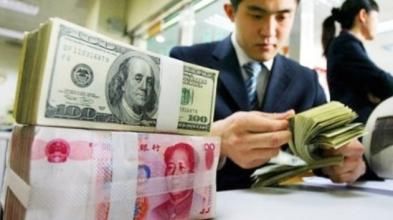By Tom McGregor, CNTV Panview commentator and editor

China and other nations must adapt to recent changes of the geo-political order. The age of globalism that favored free trade and regional economic integration deals appears to be nearing a thaw. A new era, which implies transitions to a ‘My country first-ism’, would likely emerge.
Yet that’s not necessarily bad, since globalism failed to narrow the large wealth gap, between rich and poor nations. Major multinationals scored massive revenues windfalls at the expense of declining profits and opportunities for small-and-medium sized (private) enterprises (SMEs).
For the past few decades, global governance had reigned supreme, which often placed obstacles over national sovereignty values. Either you played along with the ‘globalist elite’ or face severe economic repercussions.
Nevertheless with the winds of change, China stands poised to adapt, as well as to succeed. Beijing is moving away from its exports-oriented sector, and spurring growth in the services industry, while implementing more measures to jumpstart its domestic economy.
Reduce reliance on exports
The Caixin China Composite Purchasing Manager’s Index (PMI) hit 52.9, a 43-month high in November. According to survey data from IHS Market, any number over 50, shows confidence in the short-term outlook for the economy.
The numbers seem to prove that China’s manufacturing sector remains resilient, but upon closer inspection, it’s the services industry that keeps the domestic economy running strong.

Services companies have reported a solid increase in business activity, which have offset sharp declines in manufacturing. More factories are shutting down in the country. Inflation is beginning to rise higher than expected as well.
“Price inflation rather than a structural improvement, seems to be the main reason behind the recent recovery of the economy in general,” Zhengsheng Zhong, director of macroeconomic analysis at CEBM group told RTT News.
Not a glowing assessment, however inflation usually jumps ahead before the overall economy rises on path with it.
Setting up supply-side reforms
Added initiatives can reinvigorate China’s economy, such as adopting supply-side reforms, which highlight tax cuts, government spending reductions, stream-lining business regulations, tackling over-capacity and enhancing hi-tech upgrades to produce more high-quality products for consumers.
Chinese President Xi Jinping touted Beijing’s supply-side structural reforms in a speech at the 12th meeting of the Central Leading Group for Financial and Economic Affairs last January.
His key points endorsed, “social productivity,” as a people-centered approach to embark on “overcapacity trimming, inventory destocking, deleveraging, cost reductions and improvements to weak links in the economy,” according to DBS website.
The plan differs from the Western-understanding of supply-side reforms, but that’s because Xi added Chinese characteristics to it. Xi’s incentives would boost consumer demand for goods and services, which would be a pragmatic approach for citizens.
There’s a risk inflation rates could surge higher than expected, but that can addressed by enforcing tougher monetary policies if necessary.
Stronger yuan seems inevitable
The Western media often claims China is a “currency manipulator” and should face punitive retribution for allegedly engaging in actions to keep the Chinese yuan values low, compared to the US dollar, Euro and British pound.

Yes, China has enjoyed a large trade surplus with the USA, but other factors are at play as well. Beijing had created a favorable business climate for its manufacturing companies, by offering low tax rates, and they could hire employees at significantly lower wages than in the US.
Nonetheless, labor and operations costs have risen rapidly in China, compelling factories to move over to Southeast Asia, Africa and elsewhere. Accordingly, the drive for a lower valued RMB no longer seems to be as attractive.
A stronger yuan can spark more foreign investors to cash in on the Shenzhen and Shanghai stock exchanges that have recently connected with the Hong Kong Exchange to make it easier for foreigners to buy and sell listed Chinese stocks.
Luring in more inbound tourists
China remains a mystery to many people all over the world. Global citizens hear so many stories about China, whether good or bad. The nation has risen to become the world’s second-largest economy in the world, but it’s inbound tourism sector lags behind, compared to the United States, Europe and northeast Asian countries.

As reported by London-based World Travel and Tourism Council (WTTC), Chinese tourists traveling overseas had spent over $US215bn., a 53 percent increase from the prior year. But, foreign visitors to China had spent $US61bn (385RMBbn.) in 2015, just a 3 percent rise from 2014.
China’s tourism deficit was over $US154bn. last year. Meanwhile, many visitors to China come from high-income brackets. So if the RMB jumps up in value, they would not stop them from coming to the country.
They are likely to spend even more money here, but China still has a long way to go to upgrade its tourism sector, since Shanghai, Beijing and Guangzhou continue to be the hot spots for foreigners, while other Chinese cities go largely ignored, due to substandard tourism facilities.
What to expect in 2017 …
As expected, when Trump enters the White House with his inauguration on Jan 20, more trade wars will ensue and that will include tensions between Beijing and Washington. There’s no way to escape that.
Yet, China is already focusing on encouraging more domestic spending, rather than drive up exports, which can lessen the impact of higher tariffs on Chinese goods delivered to the US. China will likely respond with higher tariffs on US imports too.
For both countries to succeed, they must rely more on internalizing their economic structures. The US manufacturing sector will get an added boost, while Chinese buying power will get much stronger.
And there’s something to think about.
When Americans were buying up Chinese imports, the purchase spree made Chinese companies over-dependent on the US economy. If China decides not to engage in trade wars, Chinese buyers may soon make American exporters overly-reliant on them.
The roles could be reversed, but there’s some benefits to holding sway if China transforms into the world’s largest buyer of imported consumer goods and services.
( The opinions expressed here do not necessarily reflect the opinions of Panview or CCTV.com. )

Panview offers a new window of understanding the world as well as China through the views, opinions, and analysis of experts. We also welcome outside submissions, so feel free to send in your own editorials to "globalopinion@vip.cntv.cn" for consideration.















